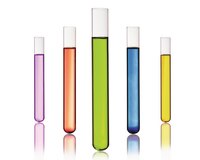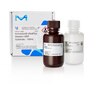808307 Sigma-AldrichTitanium(III) chloride solution about 15%
Recommended Products
Overview
| Replacement Information |
|---|
Products
| Catalogue Number | Packaging | Qty/Pack | |
|---|---|---|---|
| 8.08307.0100 | Glass bottle | 100 ml | |
| 8.08307.0500 | Glass bottle | 500 ml | |
| 8.08307.1000 | Glass bottle | 1 l | |
| 8.08307.2500 | Glass bottle | 2.5 l |
| Description | |
|---|---|
| Catalogue Number | 808307 |
| Synonyms | Titanium trichloride |
| References |
|---|
| Product Information | |
|---|---|
| HS Code | 3824 99 79 |
| Quality Level | MQ200 |
| Applications |
|---|
| Biological Information |
|---|
| Physicochemical Information | |
|---|---|
| Density | 1.21 g/cm3 (20 °C) |
| pH value | <1 (H₂O, 20 °C) (undiluted) |
| Dimensions |
|---|
| Materials Information |
|---|
| Toxicological Information |
|---|
| Safety Information | |
|---|---|
| Categories of danger | corrosive |
| Product Usage Statements |
|---|
| Storage and Shipping Information | |
|---|---|
| Storage | Store at +15°C to +25°C. |
| Packaging Information |
|---|
| Supplemental Information |
|---|
| Specifications | |
|---|---|
| Assay (cerimetric TiCl₃) | 12.5 - 17.5 % |
| Assay (argentometric, HCl) | 5 - 15 % |
| Global Trade Item Number | |
|---|---|
| Catalogue Number | GTIN |
| 8.08307.0100 | 04022536399294 |
| 8.08307.0500 | 04022536399300 |
| 8.08307.1000 | 04022536399317 |
| 8.08307.2500 | 04022536399324 |
Documentation
Titanium(III) chloride solution about 15% SDS
| Title |
|---|
Titanium(III) chloride solution about 15% Certificates of Analysis
| Product Number | Packaging | Specification | Lot Number |
|---|---|---|---|
| 8.08307.0100 | Glass bottle | PDF Specification Document | |
| 8.08307.0500 | Glass bottle | PDF Specification Document | |
| 8.08307.1000 | Glass bottle | PDF Specification Document | |
| 8.08307.2500 | Glass bottle | PDF Specification Document |















